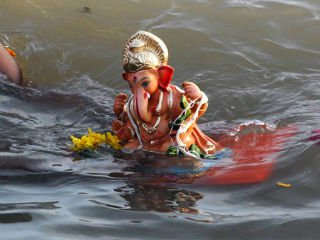It is a conspiracy to ban not only Ganeshotsav but many festivals in the name of pollution ! – Advocate Satish Deshpande

It has come to our attention that there is an ongoing conspiracy to not only restrict Ganeshotsav but also other Hindu festivals in the name of pollution. Advocate Satish Deshpande raised important questions during a special dialogue on this topic, shedding light on the lack of official information or statistics regarding the pollution caused by Ganeshotsav. hile reports from the Government point to slaughterhouses and factories as sources of pollution, there is no concrete data linking Ganeshotsav to pollution. This raises the question – On what grounds are these claims that the immersion of Ganesh Idols cause pollution, being made ? Hindus should be aware that the immersion of Ganesh Idols does not contribute to pollution, and they should also raise their voices to dispel this misconception. This was stated by advocate Satish Deshpande, who is a scholar of history and culture, while speaking on behalf of the Hindu Janajagruti Samiti during the special dialogue.
During the discussion, Mr Deepak Desai from Kolhapur, who is the District President of ‘Hindu Ekta Andolan’ highlighted the tradition in Hindu Dharma of immersing Ganesh Idols in flowing water. He questioned the opposition to these traditions from the Police and Administration and the basis for the opposition. Furthermore, the Police and Administration have failed to provide a clear response regarding any court orders supporting their actions. Mr Desai pointed out that numerous waste water canals and factories release water into the Panchaganga River in Kolhapur and the concerned authorities pay no attention to the resultant pollution. However, during Ganeshotsav, they suddenly wake up and show their concern. This raises the suspicion of systematic implementation of an agenda to suppress Hindu customs and traditions.
Mr Satish Kochrekar, the Spokesperson for the Hindu Janajagruti Samiti, Mumbai pointed out that certain environmentalists, scientists, and activists of Andhashradhha Nirmulan Samiti (ANiS) have created a false narrative suggesting pollution during Ganeshotsav. He referred to a report released by the Maharashtra Pollution Control Board in March 2023, which listed the Mithi River in Mumbai, the Kanhan River in Nagpur, and the Mula-Mutha Rivers in Pune as the most harmfully polluted Rivers. This raises the question, ‘When there is no Ganeshotsav celebration in March, what caused this pollution ?’ Mr Kochrekar criticised scientists and celebrities who remain silent about pollution from factories and slaughterhouses while emphasising pollution during Ganeshotsav. He challenged them to take concrete steps to address industrial pollution. Mr Kochrekar also called upon the Government to provide statistics that would show the reduction in overall pollution due to the establishing artificial tanks over the past decade. He emphasised that Ganeshotsav and Hindu festivals contribute to knowledge and Bliss in life and do not pose a pollution threat. Hindus are encouraged to break free from this misconception and celebrate their festivals with pride.

 Kalki 2898 AD: Legal notice served to team for allegedly hurting Hindu sentiments
Kalki 2898 AD: Legal notice served to team for allegedly hurting Hindu sentiments NGO worker distributes books on Jesus to the school students in Vidisha (MP)
NGO worker distributes books on Jesus to the school students in Vidisha (MP) Kanwar Yatra: SC stays U.P., Uttarakhand directives to display names of food stall owners and staff en route
Kanwar Yatra: SC stays U.P., Uttarakhand directives to display names of food stall owners and staff en route No one will be treated unfairly; all encroachments on Vishalgad will be removed – Maharashtra CM’s Assurance
No one will be treated unfairly; all encroachments on Vishalgad will be removed – Maharashtra CM’s Assurance HJS participates in function to pay homage to the 16 chieftains of Cuncolim in Goa
HJS participates in function to pay homage to the 16 chieftains of Cuncolim in Goa Maharashtra CM directs District Collectors to immediately close liquor and meat shops in Pandharpur during Ashadhi Wari!
Maharashtra CM directs District Collectors to immediately close liquor and meat shops in Pandharpur during Ashadhi Wari!